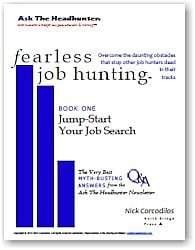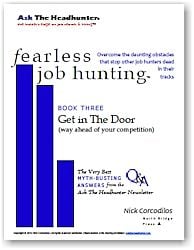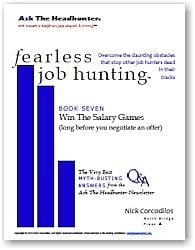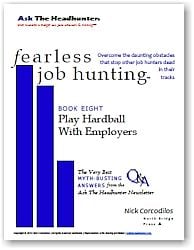Question
The last two times I accepted a job I soon regretted it. In both cases I was happy with the money, I liked the manager, and the job seemed a fit. But that’s clearly not enough. You must have some rules of thumb about the decision to reject or accept a job offer. What are they?
Nick’s Reply
 It would help to know what happened at those two jobs that led to regret. If the reasons were the same, then you may have the problem right there. But even if that’s the case, I’m more concerned about your criteria for accepting a job. They’re not sufficient.
It would help to know what happened at those two jobs that led to regret. If the reasons were the same, then you may have the problem right there. But even if that’s the case, I’m more concerned about your criteria for accepting a job. They’re not sufficient.
Insufficient reasons to accept a job
The compensation matters, of course. Anyone that suggests money is not a prime consideration is lying, is a fool, or is trying to distract you from a low offer. And just because you like someone doesn’t mean you will like working for them (or having them work for you, if you’re the manager).
Then we have your third criterion: “job fit.” This is perhaps the biggest misconception job seekers have. You might check off every box on the job description, but that doesn’t mean you’re a fit.
How can that be? Well, virtually everyone I’ve ever polled laughs when I ask them whether, six months into a new job, the work they’re doing is what they were told when they were hired. The work almost always changes and evolves, sometimes so extremely that the new hire is doing something entirely different from what they expected. (Of course, this could be a good thing or a bad thing!)
So, what can you hang your hat on when deciding whether a job is right for you?
Necessary reasons to accept a job
As you have undoubtedly experienced, most employers take their time filling a job. Most job seekers, on the other hand, are rushed. They don’t consider enough criteria when making a decision to accept a job.
I’ll grant you the three criteria you’ve mentioned are meaningful. But all three are characteristics of a job opportunity that you will instantly feel in your gut. It takes no real effort to consider them.
- I feel okay about the salary,
- The manager and I hit it off,
- The work described is right for me,
That may all be necessary to justify accepting a job, but it’s not sufficient. I think there’s more, but it requires some effort and patience.
4 criteria to accept a job offer
There are four other criteria you should apply to every job opportunity you encounter: the company’s (1) people, (2) products and technology, (3) finances, and (4) prospects. I believe if any one of these criteria is not met, you should walk away from the deal.
1. The people
The boss is just one part of the team, or the company, you’re joining. It’s likely that several other employees and managers will have a greater impact on your success (and satisfaction) at the job.
If the job is in Engineering, for example, it matters who is running Manufacturing and who is running Sales. If these latter managers are not competent, what the Engineering team designs may not be fully realized as viable products, and Sales may not be able to sell them. So you need to assess people at the company beyond just your boss before you decide to yoke your career to theirs.
Before making your decision to join up, ask to meet two or three managers whose departments are relevant to your own success. Also ask to meet two or three members of the team you’d be working on.
Accept the job only if the people in the company are competent, if not exceptional. It’s up to you to figure this out.
2. The products (and perhaps the technology)
Sure, you could do the job, but will you be working on products (or services) that are among the best in the business? Are the products competitive in the company’s market? Or is the company’s product line middling, if not low quality? Do customers rave positively about these products, or do they complain?
Does the company’s technology stack up well, or is it outdated? Will you be using tools at your job that enable you to work efficiently and to do your very best work? Or will you need to use bubblegum and baling wire to keep the machine working?
If the product line is not a shining light in the industry, and the company’s technology is obsolete, the company’s prospects probably aren’t good. Your prospects won’t be good, either.
Examine how the company’s products, services and technology compare to the competition’s. Unless you’re taking the job just for a paycheck, think twice before mounting a lame horse.
3. The company’s finances
I’d never take a job without meeting a finance manager or two at a company, or at least talking with someone that understands the company’s financial condition. This might seem irrelevant if you’re a machinist, or a programmer, or a production-line worker. But if the company has financial troubles, it may not be able to meet payroll. It may need to lay off workers before long. It may be unable to improve its technology, or afford to hire great sales people, and to compete effectively in its market.
If you’re considering a management job at a smaller company, ask for a brief meeting with the CFO. Ask about cash flow, debt and sources of funding for future growth. Even if you don’t know what these things are, the reaction you get will be telling.
At the very least, do an online search about the company’s sales and profits (if it’s publicly held). A simple search for any news articles could provide valuable insights.
4. The company’s pipeline and prospects
Invest the time to learn what new products, technologies, and business deals the company has in the pipeline. Does it have an edge over its competitors? Is it attracting new customers?
This is actually an amalgamation of the previous three criteria because we’re interested in the company’s plans for the future: What kinds of employees and managers is the company trying to attract, what new products and customers are in its pipeline, and how will it ensure its financial viability? What does the near- and long-term future look like?
If you want your future at a company to be good, you need to know how good the company’s prospects are.
Is this overkill?
In today’s fast-moving economy, when workers are more likely to jump jobs more often and employers are more likely to hire and lay off quickly, these suggestions might seem like overkill. Why do all that homework, ask for extra meetings and spend time thinking about all these factors — when you don’t plan to stick around a company very long anyway?
My answer is simple: You might get some big bumps in pay by changing jobs frequently among questionable companies. But there’s a lot to be said for working with high quality people that are producing exciting, desirable products that generate healthy profits — because that’s the path to a satisfying future for you and your employer.
A good salary, a boss you like, and work that matches your skills may be necessary for a job to work out well for you, but they’re not sufficient. Without meeting the four criteria I’ve described, I think you’re likely to be seeking another job again soon.
Accept the right job offer
What I’m really saying is, you should put a lot more into judging the place where you’re considering investing most of your waking hours. I find that the #1 reason people go job hunting is because they took the wrong job to begin with. Too often, they jump at what comes along — especially money! — rather than carefully choose the jobs and companies they pursue. The people, the products, the financial condition and the future prospects of a company will have a lot to do with your personal success.
I have no quarrel with you if you just need a job as quickly as possible so you can put food on the table and pay the rent. Take any job you must. But if you want a job with a future where you will be happy, successful and well-paid, it’s worth taking the trouble to figure all this out before you accept a job offer — so that you don’t have to go job hunting again any time soon.
What criteria do you consider important when deciding to reject or accept a job offer? Which of the four we discussed is most important to you? What criteria would you add?
: :




 You can do something pretty obvious to avoid going to work for a questionable company or accepting the wrong job: meet everyone that will affect your success. It’s not really a strategy. It’s more of a tactic that will help you confirm a really good opportunity and keep you from getting a walk-on role in a nightmare. You shouldn’t write on your hand, but if you insist, write these two words: upstream and downstream.
You can do something pretty obvious to avoid going to work for a questionable company or accepting the wrong job: meet everyone that will affect your success. It’s not really a strategy. It’s more of a tactic that will help you confirm a really good opportunity and keep you from getting a walk-on role in a nightmare. You shouldn’t write on your hand, but if you insist, write these two words: upstream and downstream.
 Ever ask a hiring manager for their resume before you agree to a job interview? No? Why not?
Ever ask a hiring manager for their resume before you agree to a job interview? No? Why not? I work in Human Resources (HR). During our on-boarding process, we send prospective employees for a drug screen and run a background investigation and, if the job requires driving, a motor vehicle record (MVR) check. The background is launched when the applicant electronically completes an authorization.
I work in Human Resources (HR). During our on-boarding process, we send prospective employees for a drug screen and run a background investigation and, if the job requires driving, a motor vehicle record (MVR) check. The background is launched when the applicant electronically completes an authorization.





 d at the reviews in Glassdoor prior to the interview and, though there were negative reviews, there were overwhelmingly positive ones as well. I was concerned about the negative reviews, so I brought it up in my interview. The recruiter stated that the office prided itself on being different from its corporate parent, and he felt I was a good fit. So I took the job.
d at the reviews in Glassdoor prior to the interview and, though there were negative reviews, there were overwhelmingly positive ones as well. I was concerned about the negative reviews, so I brought it up in my interview. The recruiter stated that the office prided itself on being different from its corporate parent, and he felt I was a good fit. So I took the job.